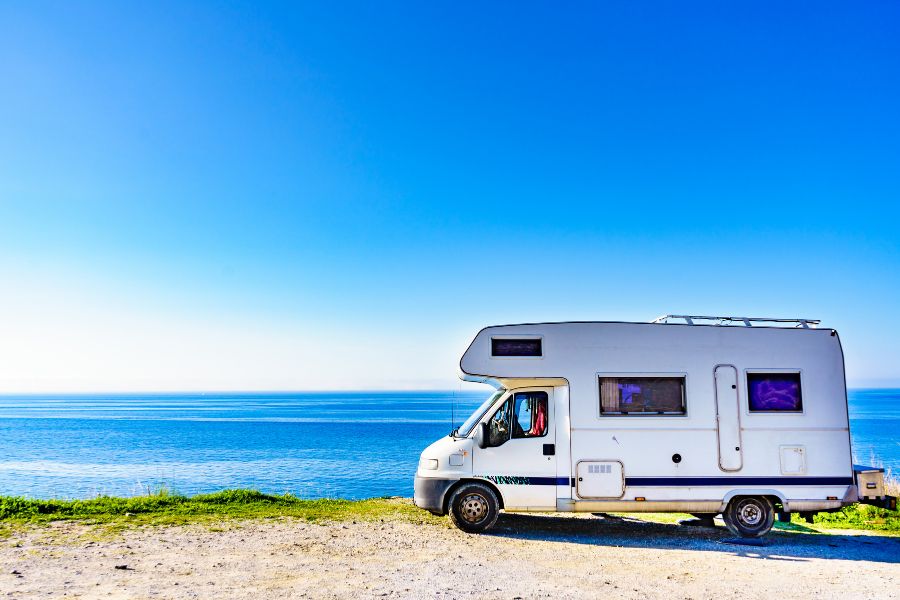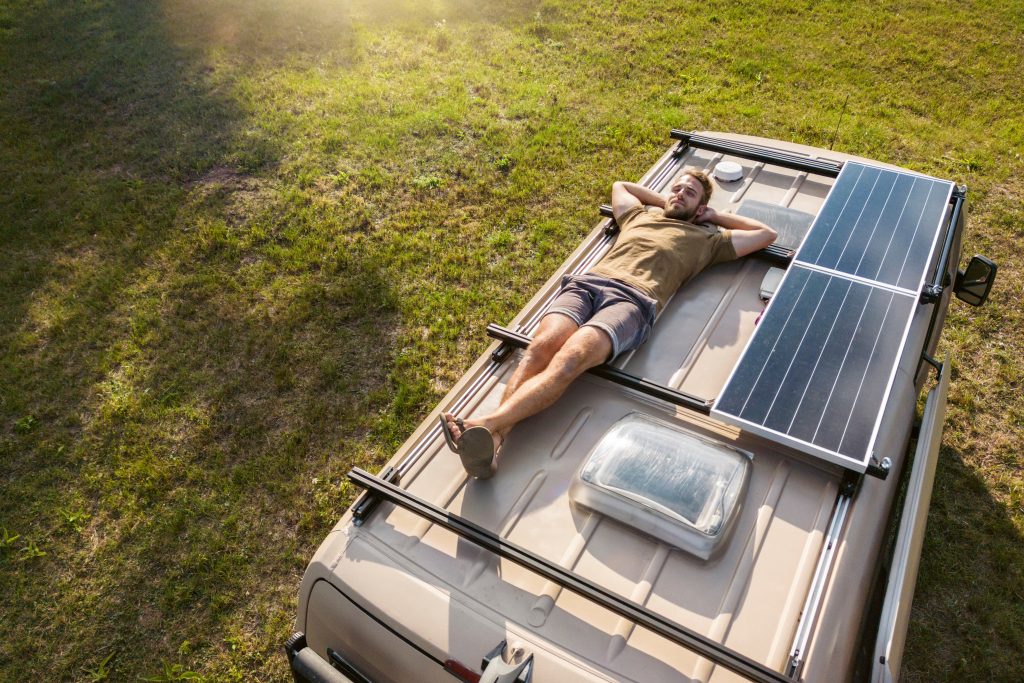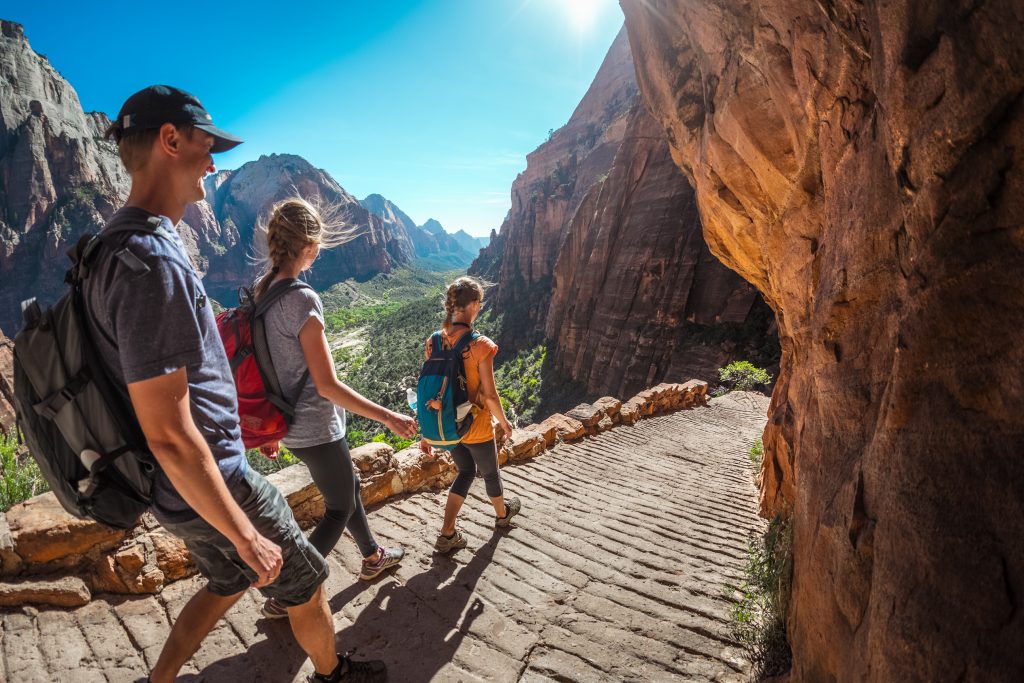Your Ultimate Guide To Full-Time RVing In 2024
Imagine a life free from the constraints of a fixed location, a life full of adventure where every morning greets you with a new view. Full-time RVing is not just about travel; it’s about embracing a lifestyle of freedom, simplicity, and exploration.
It may sound like a dream, but with proper planning and know-how, you too can embark on this exhilarating journey. Here’s your complete guide to transitioning into full-time RV living.
What To Look For In A Rig For Full-Timing

Choosing the right RV is arguably the most crucial step in your transition to a full-time RV lifestyle. Consider the following factors:
- Size: Your RV is your home on wheels, so it needs to be comfortable. The size of your rig will depend on your personal preferences, the number of occupants, and your storage needs. Keep in mind, larger RVs offer more living space but can limit where you can travel due to their size and weight.
- Layout: Ensure the RV layout suits your lifestyle. Do you need a workspace for remote work? Is a spacious kitchen important to you? Consider these elements before making your choice.
- Condition: Buying new provides a warranty and modern amenities, but used RVs can be much more budget-friendly. If you choose a used RV, get a professional inspection to avoid expensive repairs down the road.
- Towing or Motorized: Decide between a towable RV (like a fifth wheel or travel trailer) or a motorized one (like a Class A, B, or C motorhome). Motorized RVs are more convenient to set up at campsites, while towable ones let you detach your vehicle for easy exploration.
For more in depth information about choosing between different classes of RV, check out these articles here!
Considerations For Full-Time RVing

Before you trade your fixed home for a life on wheels, it’s vital to understand and plan for the range of considerations that come with full-time RVing. Here are some key factors:
Budget
Full-time RV living is not always cheaper than traditional living. It requires careful financial planning. Begin with estimating the initial cost of the RV itself, but remember to include other expenses. These include insurance, maintenance, campground fees, fuel, utilities like internet, laundry, and groceries.
Your travel style also impacts your budget; for instance, regularly visiting high-end RV resorts will cost more than boondocking (camping for free) in national forests.
Healthcare and Insurance
Traveling around the country doesn’t mean you can skip healthcare. Look for healthcare providers that offer nationwide coverage, suitable for your nomadic lifestyle. A health-sharing plan could be an alternative to traditional insurance. On the other hand, RV insurance is crucial and typically more complex than regular car insurance. It should cover not only the vehicle but also your belongings inside and potential liability for damage at campgrounds.
Legalities and Logistics
As a full-time RVer, you’ll need to choose a domicile, a legal home base for purposes like tax, vehicle registration, insurance, and voting. States like Florida, Texas, and South Dakota are popular among full-time RVers due to their tax benefits, simple residency requirements, and RV-friendly policies. A mail forwarding service can help you receive important documents on the road.
Minimalism
Full-time RVing calls for significant downsizing. The limited space means you need to carefully consider each item you pack. Look for multi-functional items that save space and make RV living more convenient. But minimalism isn’t just about saving space; it’s a mindset. It’s about valuing experiences over possessions.
Work and Travel

If you’re not retired, you’ll need to figure out how to earn an income while on the road. Many full-time RVers embrace remote work, also known as digital nomadism. Some popular options include freelance writing, graphic design, consulting, or running an online business.
Workamping
Workamping, a term derived from “work” and “camping,” offers an excellent way to sustain your full-time RV lifestyle while also integrating into the RV community. It involves working part or full-time at a campground or related business in exchange for a free campsite, utilities, and often, a small wage.
The idea is to balance work and exploration, allowing you to immerse yourself in different locations while offsetting some of the costs of full-time RVing.
Types of Workamping Jobs
Workamping jobs are as diverse as the places you’ll stay, catering to a wide range of skills and interests:
- Campground Hosting: This is one of the most common workamping roles. It involves helping with the day-to-day operations of a campground. Tasks may include checking in guests, answering questions, maintaining facilities, and coordinating events.
- Seasonal Positions: Many businesses, especially in tourist areas, hire seasonal workampers. Examples include theme parks, ski resorts, and Christmas tree sales.
- Agriculture Jobs: Some farms and vineyards hire workampers for planting and harvest seasons. This could be a good fit if you enjoy physical work and want to learn more about agriculture.
- Maintenance and Repair: If you’re handy, many places need help with building, repairing, and general upkeep.
Finding Workamping Jobs
Numerous resources can help you find workamping opportunities:
- Online Platforms: Websites like Workamper News, CoolWorks, Workers On Wheels, or even Facebook groups regularly post workamping jobs.
- RV Parks and Campgrounds: Directly reach out to RV parks and campgrounds. Some have information about workamping opportunities on their websites.
- Networking: The RV community is a valuable resource. Attend RV rallies, join online RV forums, and connect with other workampers. Word-of-mouth can sometimes lead to the best opportunities.
Things to Consider
Before accepting a workamping position, consider the following:
- Work Hours: Understand the required work hours and how they’ll fit into your lifestyle. Will you have enough time to explore and enjoy your surroundings?
- Compensation: Are you working solely in exchange for a campsite, or is there additional pay? What utilities or amenities are included?
- Location: Is the job in a location you’re excited to explore? How close is the nearest town or grocery store?
- Work Culture: Try to get a sense of the work environment and the management style. Reviews from past workampers can be insightful.
Workamping can enrich your full-time RVing experience by providing not only financial benefits but also opportunities for learning new skills, making friends, and becoming a part of diverse communities. Click here for even more in depth information about workamping!
Check out this awesome resource for more information about working remotely in an RV!
Buying vs Renting An RV For Full-Time Travel
Whether to buy or rent an RV depends on how long you plan to travel and your budget. Buying can be cost-effective if you plan to live on the road for several years. However, it requires a significant upfront investment.
Renting may be a better choice for those testing the waters before committing to the lifestyle. It allows you to try different RV types and sizes to find what suits you best without a long-term financial commitment.
Pro Tip: Did you know that on RVnGO, you can rent or buy RVs?
The Social Aspects of Full-Time RVing
Living on the road doesn’t mean isolation. Quite the contrary, the RV community
is full of welcoming people from all walks of life. Campgrounds, RV clubs, and online forums provide excellent opportunities to make friends, share advice, and even organize meetups or caravan trips together.
Still, it’s important to consider that you might not have constant companionship unless you’re traveling with a partner or family, which can feel lonely for some people.
Staying Connected

Staying connected while living in an RV involves more than just maintaining internet access. It also encompasses having a reliable power source to keep your devices running smoothly. Here’s how you can navigate this aspect:
Solar Power
Harnessing solar power can be a game-changer for full-time RVers. With a solar power system, you can generate your own electricity, making you less reliant on campgrounds and allowing you to boondock in remote areas.
The heart of your solar power setup will be the solar panels. These can be installed on the roof of your RV, or you can use portable panels that you set up at each campsite. The energy generated by the panels is stored in your RV’s battery bank for use as needed.
Keep in mind that the efficiency of solar power depends on several factors like the weather, season, and your location. It’s wise to have a backup power source for days when the sun isn’t shining.
Generators
Generators can be a reliable source of power for your RV, especially if you’re in an area with limited sunlight or during periods of high power consumption. There are three types of generators typically used by RVers:
- Gasoline Generators: These are the most common type of portable generators due to their lower cost. However, they can be noisy and require frequent refueling, which can be inconvenient.
- Propane Generators: Propane generators run cleaner and quieter than their gasoline counterparts. They’re also easy to refuel if you’re already using propane in your RV. The downside is that they’re usually less efficient than gasoline generators.
- Diesel Generators: If your RV runs on diesel, a diesel generator could be a convenient option as you won’t need to carry a separate type of fuel. Diesel generators are also known for their longevity and efficiency.
Consider the noise level, fuel efficiency, and power output of the generator before making your choice. Remember that many campgrounds have quiet hours and restrict generator use, so it’s essential to have a quiet model.
Starlink
Maintaining reliable internet connectivity is crucial for full-time RVers, especially if you’re working or schooling on the road. Starlink, a satellite internet service provided by SpaceX, could be an excellent solution for those venturing into remote areas where cellular service is weak or nonexistent.
Starlink provides broadband internet connections through a network of satellites in low earth orbit. The service requires a small satellite dish, which can be mounted on your RV. As of my knowledge cutoff in September 2021, the mobility and coverage of Starlink service were still evolving. So, be sure to check the latest updates and reviews to understand if this service
would be a fit for your RV lifestyle.
Balancing your power needs and internet connectivity can be challenging when living on the road. By combining solar power, a suitable generator, and a reliable internet solution like Starlink, you can create a connected and comfortable living environment, whether you’re at a full-service campground or nestled in the wilderness.
For more in depth information on generators, solar power, and Starlink services, check out these articles here!
Educational Opportunities

If you’re on the road with children, the world becomes their classroom. This approach to learning, often called roadschooling or worldschooling, offers unique opportunities:
- Experiential Learning: Use your travels to teach geography, history, science, and culture in a hands-on, immersive way. Visiting historical sites, national parks, museums, and cultural landmarks can provide richer learning experiences than a traditional classroom.
- Life Skills: Full-time RVing naturally teaches children essential life skills such as adaptability, problem-solving, and resilience. They’ll learn practical skills too, like cooking, cleaning, navigating, and maybe even basic RV maintenance.
- Personalized Education: The flexibility of roadschooling allows you to cater education to your child’s interests and pace. If your child shows interest in space, you can plan a visit to a space center or planetarium. If they love wildlife, national parks become outdoor biology classrooms.
- Social Skills: While the idea of roadschooling may raise concerns about socialization, the RV community is a diverse and welcoming social environment. Children get the opportunity to interact with people of all ages and backgrounds. Additionally, joining RV clubs or participating in community events at campgrounds can provide kids with a sense of belonging and opportunities for making friends.
- Online Resources: Numerous online curriculums and resources can support your child’s academic learning on the road. Many of these programs are self-paced, allowing for a flexible schedule that fits in with your travel plans.
Maintenance
Taking care of your RV is akin to maintaining both a vehicle and a house. Proper and regular maintenance can save you from unwanted breakdowns and costly repairs.
- Engine and Tires: Like any other vehicle, an RV needs regular engine check-ups. Change oil according to the manufacturer’s recommended schedule and keep an eye on all other fluid levels. Rotate your tires and check their pressure and tread depth regularly to ensure they’re in good shape for travel.
- RV Systems: Familiarize yourself with your RV’s electrical, water, and gas systems. Inspect your appliances, air conditioning units, and heaters for any malfunctions before they become bigger issues.
- Plumbing: Your RV’s plumbing is crucial for a comfortable living. Regularly check for leaks, and drain and clean your tanks regularly. Carry out preventive measures to avoid frozen pipes during cold weather.
- Interior and Exterior Inspections: Regularly check the roof, windows, and seams for any signs of leaks. A small leak can quickly turn into a major issue, causing significant damage to your RV’s interior. Clean and seal your RV’s exterior as recommended by the manufacturer to keep it looking its best and to prevent issues like rust or delamination.
For more in depth information about RV maintenance tips and tricks, check out these articles here!
Safety
Finally, RV safety should never be overlooked. Invest in a quality RV security system, always keep your RV locked, and don’t share your specific location on social media. Keep a first-aid kit on board and learn what to do in case of an emergency. And always be aware of the weather and road conditions, planning your travel accordingly.
Final Thoughts
Embracing full-time RV living is not just about changing where you live; it’s a lifestyle transformation that requires comprehensive planning and adjustment. It challenges traditional norms about work, education, and what a home should be.
However, the rewards can be immense: the freedom to explore, the joy of simplicity, and the enriching experiences that come with life on the open road. With careful preparation and a sense of adventure, you can successfully transition to and thrive in your full-time RV journey.